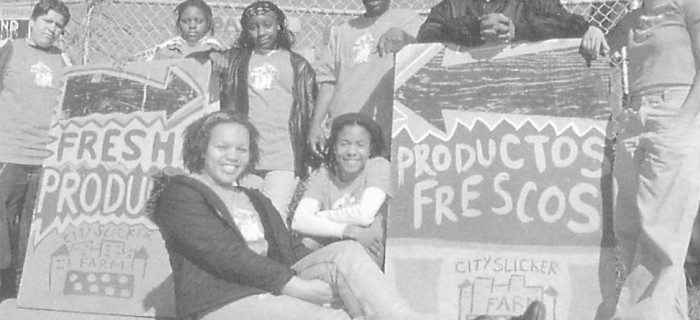Breaking Ground: The Community Food Security Movement
Food First Backgrounder, Winter 2004, Vol. 10, No. 1
The U.S. is the world ‘s largest producer and exporter of food, yet in 2002, 35 million Americans didn’t know where their next meal was coming from. At the same time, nearly two-thirds of Americans were overweight. Although hunger is still a reality for those living in poverty, our food system has created a condition where “obesity is now a greater threat to the health and well-being of America’s poor” than hunger.
One reason the food system is so sick is that supermarkets are virtually nonexistent in poor communities. Wealthier neighborhoods have two to three times as many supermarkets as lower-income areas, and white neighborhoods have up to four times more supermarkets than African-American neighborhoods. Without access to nutritious food, poor communities will have unhealthy diets.”
Access to safe and nutritious food concerns not only America’s poor. Approximately 2,000 Americans die each year from food poisoning caused by salmonella and E. coli, in part due to large-scale food processing. And in our industrialized, profit-maximizing agricultural system, mad cow disease has now become a reality.
Today, just ten companies supply more than half the food and drink sold in the United States. Corporate consolidation of the food industry has reduced farmers to less than 1 percent of the U.S. population, and because production and distribution is so centralized, food now travels on average 1,500 to 2,500 miles from farm to plate in the U.S.
Recognizing that dramatic changes aren’t imminent in the profit-driven food system, a diverse network of activists across America have begun organizing for a just food system that benefits consumers and farmers. Family farm groups, food banks, community gardeners, nutritionists, environmentalists, and community development organizations are striving to achieve community food security—a condition wherein everyone has a safe, culturally acceptable, nutritious diet through a sustainable food system that maximizes community self-reliance and social justice.
According to Andy Fisher, Executive Director of the Community Food Security Coalition, this movement, which has flowered in the past seven years, seeks to democratize food production and distribution by localizing food, using more sustainable and health-promoting practices, and meeting the needs of underserved communities.
Stay in the loop with Food First!
Get our independent analysis, research, and other publications you care about to your inbox for free!
Sign up today!

 Help Food First to continue growing an informed, transformative, and flourishing food movement.
Help Food First to continue growing an informed, transformative, and flourishing food movement.




